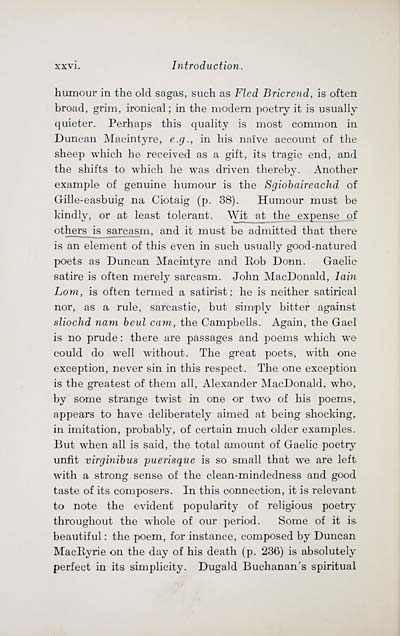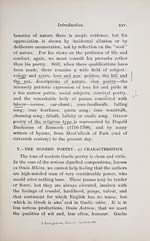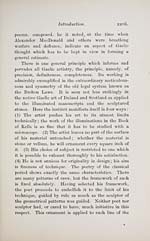Download files
Complete book:
Individual page:
Thumbnail gallery: Grid view | List view

xxvi. Introdiiction.
humour in the old sagas, such as Fled Bricrend, is often
bro.ad, grim, ironical ; in the modern poetiy it is usually
quieter. Perhaps this quahty is most common in
Duncan Macintyre, e.g., in his naive account of the
sheep which he received as a gift, its tragic end, and
the shifts to which he was driven thereby. Another
example of genuine humour is the Sgiobaireachd of
Gille-easbuig na Ciotaig (p. 38). Humour must be
kindly, or at least tolerant. \Vit at the expense pf
othersJs_sarcasm, and it must be admitted that there
is an element of this even in such usually good-natured
poets as Duncan Macintyre and Eob Donn. GaeHe
satire is often merely sarcasm. John MacDonald, lain
Lom, is often termed a satirist : he is neither satirical
nor, as a rule, sarcastic, but sinnply bitter against
sliochd nam heul cam, the Campbells. Again, the Gael
is no prude : there are passages and poems which we
could do well without. The great poets, with one
exception, never sin in this respect. The one exception
is the greatest of them all, Alexander MacDonald, who,
by some strange twist in one or two of his poems,
appears to have dehberately aimed at being shocking,
h\ imitation, probably, of certain much older examples.
But when all is said, the total amount of Gaehc poetry
uniit virgiìiibus -puerisque is so small that we are left
with a strong sense of the clean-mindedness and good
taste of its composers. In this oonnection, it is relevant
to note the evident popularity of reUgious poetry
throughout the whole of our period. Some of it is
beautiful : the poem, for instance, composed by Duncan
MacRyrie on the day of his death (p. 236) is absolutely
perfect in its simphcity. Dugald Buchanan's spiritual
humour in the old sagas, such as Fled Bricrend, is often
bro.ad, grim, ironical ; in the modern poetiy it is usually
quieter. Perhaps this quahty is most common in
Duncan Macintyre, e.g., in his naive account of the
sheep which he received as a gift, its tragic end, and
the shifts to which he was driven thereby. Another
example of genuine humour is the Sgiobaireachd of
Gille-easbuig na Ciotaig (p. 38). Humour must be
kindly, or at least tolerant. \Vit at the expense pf
othersJs_sarcasm, and it must be admitted that there
is an element of this even in such usually good-natured
poets as Duncan Macintyre and Eob Donn. GaeHe
satire is often merely sarcasm. John MacDonald, lain
Lom, is often termed a satirist : he is neither satirical
nor, as a rule, sarcastic, but sinnply bitter against
sliochd nam heul cam, the Campbells. Again, the Gael
is no prude : there are passages and poems which we
could do well without. The great poets, with one
exception, never sin in this respect. The one exception
is the greatest of them all, Alexander MacDonald, who,
by some strange twist in one or two of his poems,
appears to have dehberately aimed at being shocking,
h\ imitation, probably, of certain much older examples.
But when all is said, the total amount of Gaehc poetry
uniit virgiìiibus -puerisque is so small that we are left
with a strong sense of the clean-mindedness and good
taste of its composers. In this oonnection, it is relevant
to note the evident popularity of reUgious poetry
throughout the whole of our period. Some of it is
beautiful : the poem, for instance, composed by Duncan
MacRyrie on the day of his death (p. 236) is absolutely
perfect in its simphcity. Dugald Buchanan's spiritual
Set display mode to: Large image | Transcription
Images and transcriptions on this page, including medium image downloads, may be used under the Creative Commons Attribution 4.0 International Licence unless otherwise stated. ![]()
| Early Gaelic Book Collections > Matheson Collection > Bardachd Ghaidhlig > (30) |
|---|
| Permanent URL | https://digital.nls.uk/76422891 |
|---|
| Description | Specimens of Gaelic poetry 1550-1900. |
|---|---|
| Shelfmark | Mat.50 |
| Additional NLS resources: | |
| Attribution and copyright: |
|
| Description | Items from a collection of 170 volumes relating to Gaelic matters. Mainly philological works in the Celtic and some non-Celtic languages. Some books extensively annotated by Angus Matheson, the first Professor of Celtic at Glasgow University. |
|---|
| Description | Selected items from five 'Special and Named Printed Collections'. Includes books in Gaelic and other Celtic languages, works about the Gaels, their languages, literature, culture and history. |
|---|

